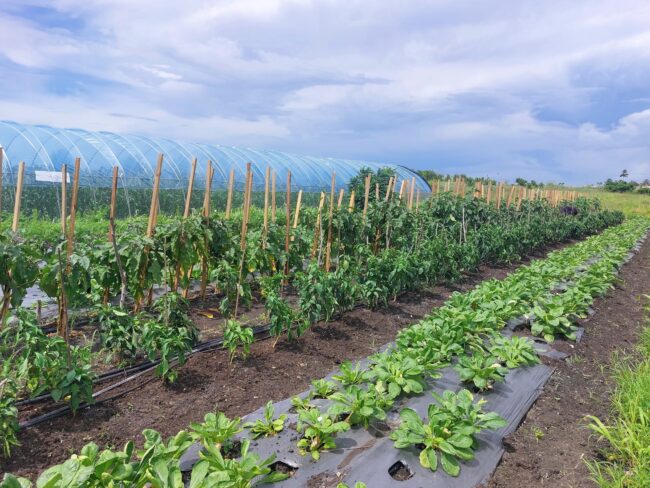Digital Transformation in Agriculture: Challenges and Opportunities in Barbados

Disclaimer: The author expresses the need for agricultural technology integration in Barbados, highlighting the challenges faced by subsistence farming and limited education. Investment in technology is crucial for sector growth.
Disclaimer: The views and opinions expressed by the author(s) do not represent the official position of Barbados TODAY.
By Steven Williams
One of the more challenging sectors from a regional perspective to achieve progress in digital transformation is agriculture. It has long been overdue for basic information technology integration. While it’s true that some of the larger players in the local chicken and poultry production sector have been utilising environmental and systems monitoring technology for years, it’s still considered a novelty.
One of the main reasons for the limited development in agriculture can be attributed to two key factors. Firstly, the predominance of subsistence farming, where the primary goal is meeting household needs rather than commercial profit, results in minimal reinvestment, particularly in areas like agricultural technology for yield analysis and forecasting. Secondly, our secondary education system primarily emphasises Integrated Science for future agriculturalists, providing limited exposure to agricultural technology. While the University of the West Indies in Trinidad offers a comprehensive Agriculture degree programme covering various disciplines, including technology, accessibility to this specific programme may be a challenge for many Barbadian agriculturalists due to its Trinidad-based location.
Despite the sector’s technology challenges, I was encouraged by the direction of the minister of agriculture with the use of drone surveillance and mapping systems to adopt a comprehensive action plan to combat crop and animal theft. Additionally, I found the words of Independent Senator Dr Chelston Brathwaite in October 2023 quite meaningful, stating, ‘In order for Barbados’ agricultural sector to experience significant growth, there needs to be substantial investment in technology.’
While I may not be an agrotechnologist by any stretch of the imagination, I am a student of technology as a tool for problem-solving and enhancing life. So, it got me thinking about contributing my skills to address one of the most significant challenges to national security, which is food security. I began pondering what basic technologies available today could be used to enhance the agricultural sector.
While driving, I observed a group of blackbelly sheep wandering aimlessly, and I was impressed by the farmers’ ability to locate these grass-feeding nomads. This made me curious about technological innovations that could offer more precise location information for livestock. That’s when I discovered Device Matters, which provides location data for farmers to monitor their animals.
Device Matters offers robust GPS livestock tracking devices for real-time monitoring. These devices are lightweight and unobtrusive, attaching to animals’ collars or ear tags. They provide accurate location data, support geofencing to prevent theft, monitor activity levels for health insights, and offer long battery life. These devices serve to enhance livestock management, prevent theft, monitor health, and optimise grazing patterns.
That bit of research led me to solutions for monitoring crop production because agriculture is not just one product or crop. This may be one of the other reasons why technology integration has been so elusive.
Nevertheless, when it comes to the labour-intensive crop industry, FarmBot is an innovative farm management software and hardware solution starting at US$3 000. It streamlines the labour-intensive crop industry by simplifying tasks like planting, watering, and weeding. This user-friendly system allows farmers to create precise planting plans, with an automated seeding system that ensures optimal seed placement for minimised waste and maximised yields. Once planted, FarmBot monitors crop growth using sensors, including cameras and environmental sensors, enabling farmers to track crop health, detect pests and diseases, and adjust irrigation schedules. Its crop mapping feature aids in visualising and tracking crop progress, making FarmBot a time-saving and waste-reducing tool suitable for both small-scale and large-scale farmers.
While this article was inspired by the use of drones for agriculture crop surveillance, drones have much broader potential. Wireless drones, in particular, have gained popularity in the agricultural domain for their ability to capture valuable data and provide real-time insights. By combining high-resolution cameras, sensors, and wireless communication, these drones enable farmers to monitor crops, identify potential problems, and make informed decisions.
Here are some key applications of wireless drones in precision farming:
Crop Spraying: Drones equipped with spraying mechanisms can precisely target crops, reducing chemical usage and ensuring an even distribution of fertilisers, pesticides, and herbicides.
Pest Control: Drones can spot pest-infested areas in fields, enabling targeted pest control measures. This reduces crop loss and minimises the use of harmful chemicals.
Illegal Land use: An FAO publication E-agriculture in action: drones in agriculture provides governments with the possibility to document illegal land and resource use, enhancing monitoring and enforcement with tools like high-resolution imaging for detecting illegal farming activities.
In conclusion, the advancement of Barbados’ agricultural sector hinges on integrating technology, such as GPS livestock tracking, FarmBot for crop management, and versatile drones for precision farming. These innovations are crucial for revolutionising the industry, enhancing food security, and uplifting both commercial and small-scale farmers. It’s imperative for the government and educational institutions to facilitate access to these technologies and incorporate them into educational curricula. Embracing this digital transformation will not only make Barbados’ agriculture more efficient and sustainable but also position the country as a leader in modern, technologically advanced farming.
Steven Williams is the executive director of Sunisle Technology Solutions and the principal consultant at Data Privacy and Management Advisory Services. He is a former IT advisor to the Government’s Law Review Commission, focusing on the draft Cybercrime bill. He holds an MBA from the University of Durham and is certified as a chief information security officer by the EC Council and as a data protection officer by the Professional Evaluation and Certification Board (PECB). Steven can be reached at: Mobile: 246-233-0090 Email: [email protected]


